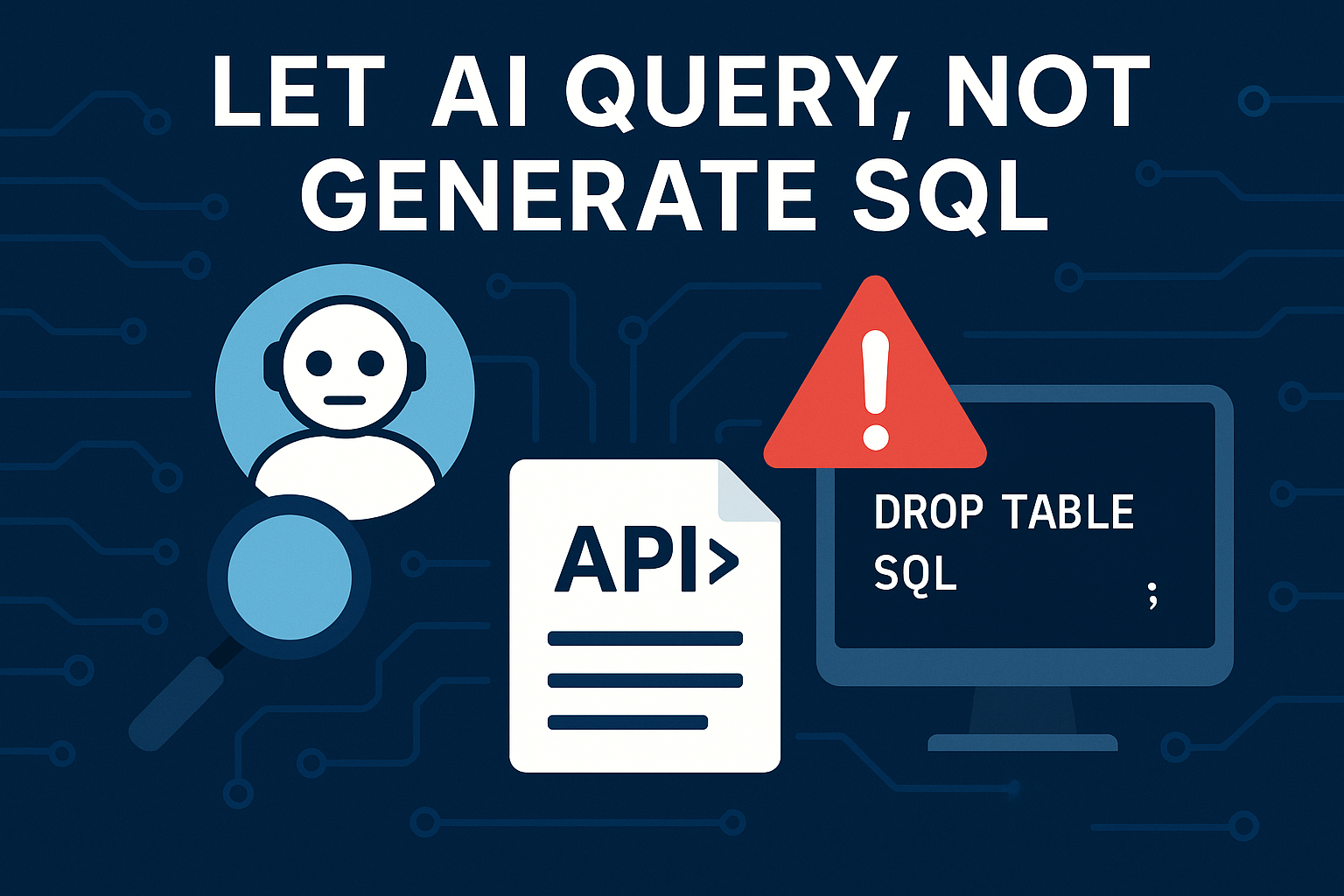The idea of using an AI like GPT-5 or any LLM based tool to generate SQL from natural language sounds like a productivity goldmine. Ask the AI a question, and it automatically writes and executes the perfect query. Insight on demand. No SQL expertise needed.
But beneath this automation lies a serious threat. Giving AI systems free rein to generate and run SQL against your production database is not just risky—it could be catastrophic.
Why AI-Generated SQL is a Security Red Flag
AI models lack full awareness of your business rules, security policies, and data classifications. That means:
- They might expose sensitive records through poorly scoped queries.
- They may generate malformed or inefficient SQL that strains your infrastructure.
- They could be tricked by prompt injection into producing malicious SQL—like
DROP TABLEcommands.
This blending of prompt injection and SQL injection creates a hybrid attack vector that’s difficult to detect. As practitioners have noted, seemingly innocent prompts can morph into destructive queries through subtle manipulation of the AI’s instructions.
Incorrect AI SQL Can Mislead the Business
Even without bad actors, AI-written SQL can be dangerous. It might join the wrong tables, apply the wrong filters, or group by incorrect fields—producing inaccurate reports that influence real business decisions. And because the SQL looks plausible, these errors can go unnoticed until real harm is done.
Best Practice: Pre-Built Queries, Not Freeform SQL
To avoid this, the new best practice is to let AI select from a predefined set of queries instead of writing SQL from scratch. This creates a secure boundary where the AI can still perform useful analysis—but only within your defined parameters.
As one expert put it: “LLMs should choose between pre-built queries, not invent them on the fly.”
Enter DreamFactory’s MCP: A Secure AI Data Gateway
This is exactly what DreamFactory’s Model Context Protocol (MCP) enables. Instead of giving your AI SQL access, you expose safe, RESTful API endpoints that encapsulate vetted queries or business logic.
Examples:
GET /api/orders?customer_id=123POST /api/reporting/daily-salesGET /api/employees?status=active
Behind the scenes, these routes map to secure, parameterized SQL queries or stored procedures. But the AI never sees or writes SQL directly—it just calls an approved API endpoint.
Benefits of the REST API Sandbox
By using DreamFactory’s REST API model, you achieve:
- SQL injection protection: All queries are parameterized and validated.
- Role-based access control: Endpoints are tied to user roles with strict permissions.
- Audit logging: Every call is tracked and timestamped for accountability.
- No credential exposure: DB login info stays server-side, never passed to the AI.
This “sandboxed” model allows your AI to interact with enterprise data safely, without giving it free access to your entire schema.
Custom Logic and Governance Included
DreamFactory’s platform allows you to add server-side logic—such as pre-processing rules, filters, or authorization checks—behind each endpoint. This enforces business rules that the AI doesn’t understand, and ensures consistent data handling across users and bots.
It also supports API-level security features like:
- API key enforcement
- OAuth authentication
- Query timeouts and rate limits
These protections apply to every API call, whether it comes from an internal app or an LLM-powered chatbot.
Conclusion: Let AI Ask, But Don’t Let It Write SQL
AI-driven data access doesn’t require giving AI a blank check to write SQL. With platforms like DreamFactory MCP, you create a controlled interface where the model can only fetch data through APIs you’ve designed, tested, and secured.
This brings the best of both worlds: natural language interfaces with safe, auditable access to enterprise data. No rogue queries. No dropped tables. No exposed secrets.
Build smart. Secure early. Let the AI call safe APIs—not invent unsafe SQL.
FAQs: AI-Generated SQL and Enterprise Security
-
Is it safe to let ChatGPT or Claude write SQL?
-
No. AI models can be manipulated through prompt injection and don’t fully understand your security model. This makes them risky SQL authors, especially in production environments.
-
What’s the alternative to AI writing SQL?
-
Use REST APIs to expose only the queries you approve. The AI can call these endpoints to get data, without needing to know how to write SQL.
-
What does DreamFactory’s MCP do?
-
MCP (Model Context Protocol) is DreamFactory’s AI data gateway. It creates secure REST APIs from your databases, so LLMs can access business data without ever seeing raw SQL or credentials.
-
How does this prevent SQL injection?
-
All DreamFactory-generated APIs use parameterized queries and input validation. Any input from the AI is sanitized, making it impossible to inject arbitrary SQL commands.
-
Can I add logic or validation behind an API endpoint?
-
Yes. You can add server-side scripts, stored procedures, and access filters in DreamFactory to enforce complex business rules.
-
Does this integrate with OpenAI or other LLMs?
-
Absolutely. You can configure tools like ChatGPT or Claude to call your DreamFactory endpoints via API plugins or function calls.
-
Is this a zero-trust architecture?
-
Yes. DreamFactory enforces zero-trust by validating, authenticating, and logging every API request. The AI operates under strict access rules defined by you.
Kevin McGahey is an accomplished solutions engineer and product lead with expertise in API generation, microservices, and legacy system modernization, as demonstrated by his successful track record of facilitating the modernization of legacy databases for numerous public sector organizations.
























 Blog
Blog

